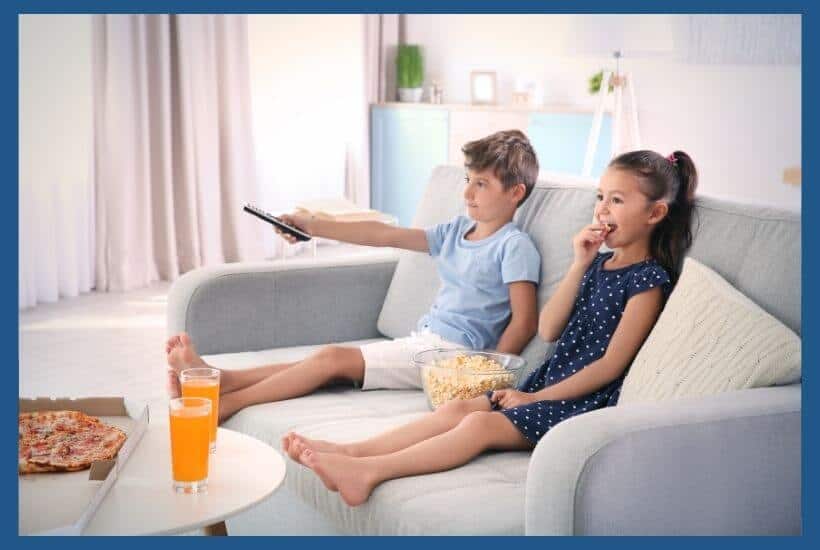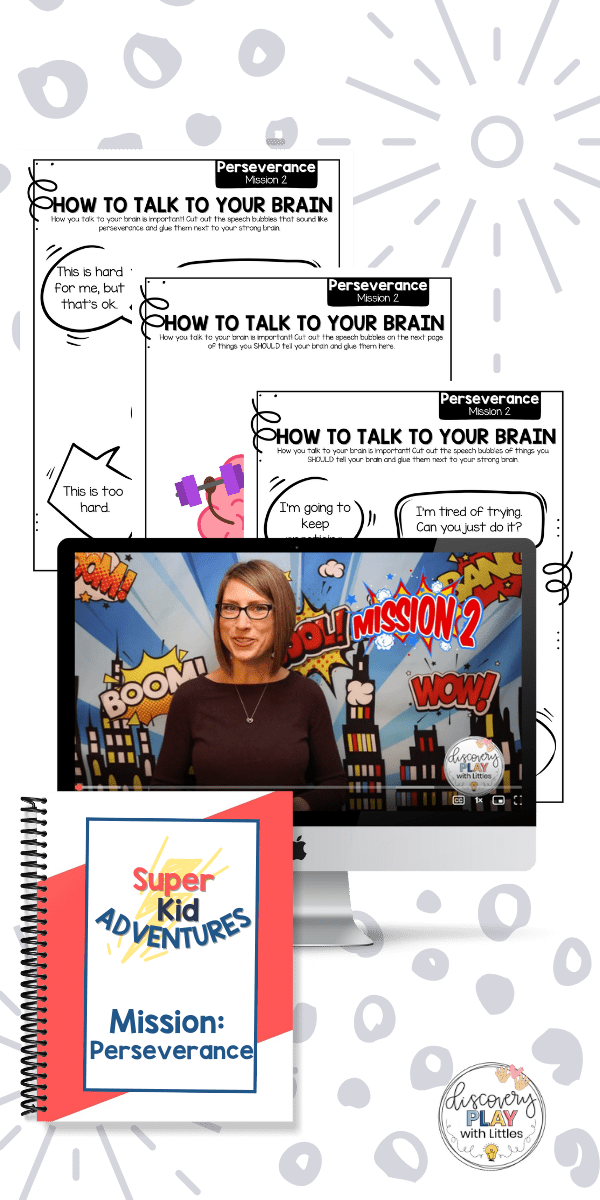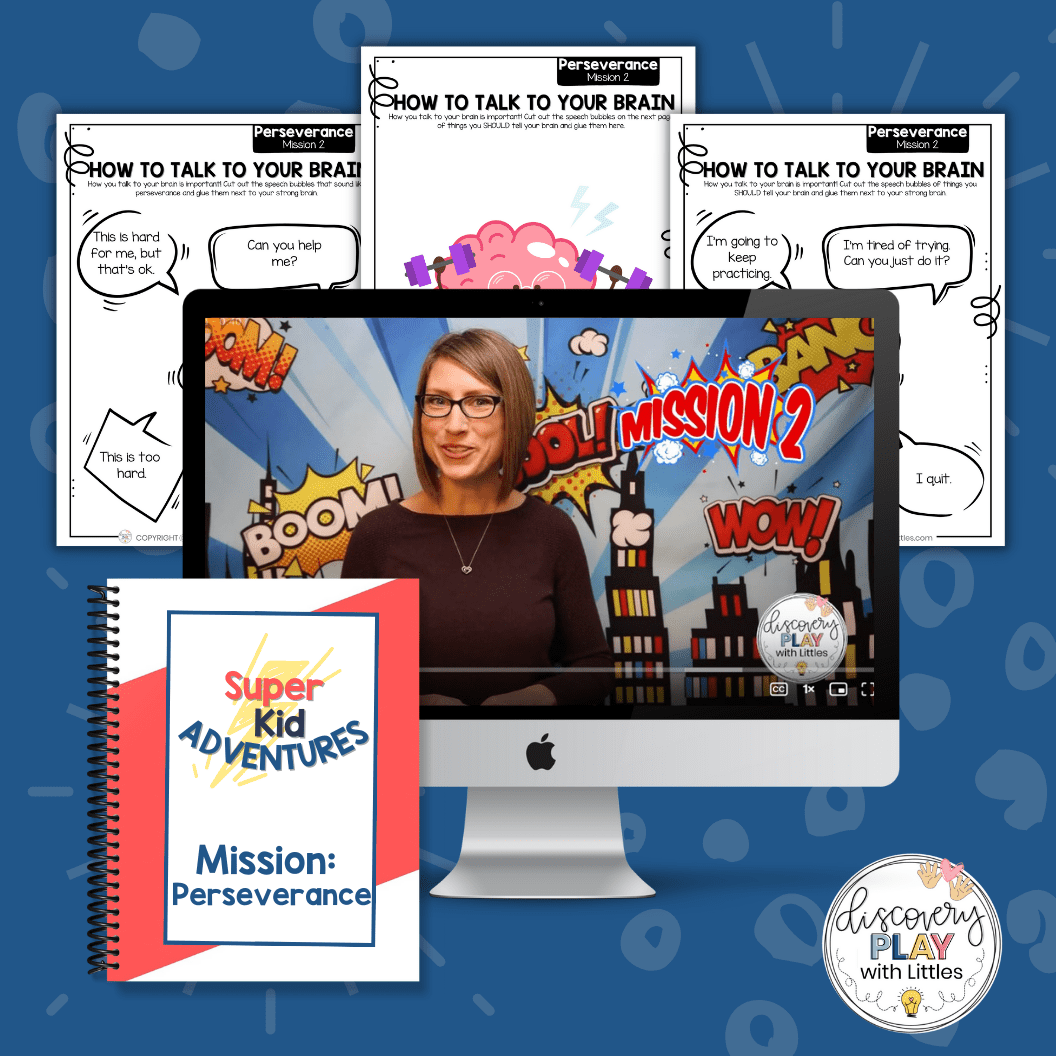My 3-year-old asked the all-too-familiar question, “Mama, can I watch something?” This question drives me crazy, especially on a beautiful day. “Bud, let’s keep playing outside!” (To which his response was “but when can I watch something?”) Ugh.
The kid loves his TV. The funny thing is he doesn’t get a lot of it, but man, he loves his shows.
That love has this kindergarten teacher mama concerned.
I’ll never forget one of the years I was teaching kindergarten, I had a little boy who struggled. He didn’t just struggle with academics, but with every aspect of kindergarten.
Socially, he couldn’t make friends. He didn’t know how to engage with other kids.
Reading groups were difficult because he struggled to turn the pages of a book.
Writing or even coloring was difficult. Not only was he not interested, but he didn’t have the proper control over a pencil, crayons, or scissors which made it hard.
Even recess was difficult because he almost seemed lost during “free” time. He had no idea what to do, and playing with others was of no interest to him.
Learning was difficult. He didn’t know what letters were, or how to count.
Time at our meeting area was almost hopeless because focus was nonexistent for him.
He even didn’t know how to carry on a conversation with me when I would talk to him about his day or what he was doing.
Sometimes it was hard to understand him because he struggled to pronounce words correctly.
The one thing he could talk about? Minecraft. (And once in a while his favorite TV shows).
He couldn’t engage you in conversation, but he could teach you about Minecraft. It was a one-sided conversation though. He would talk AT you, not WITH you.
Unfortunately, this is not the only child who struggles like this. Kids who are struggling like this are becoming more and more common in kindergarten. What makes kids struggle like this? Too much screen time.

The negative effects of technology on kids brains
Kids who spend a lot of their time on screens are behind their peers in every area. (And yes, this even includes “Learning Apps”).
Kids who have too much screen time struggle with:
- Making friends and engaging with their peers- They aren’t exposed to holding conversations or relating to others when they are focused on a screen
- Any fine-motor related tasks- Kids aren’t getting the practice they need using their fingers when they are staring at a screen, pressing buttons, or swiping on your phone
- Focus- Their brains are constantly being fed with flashing colors and shots of dopamine when they get answers correct and the game tells them “good job.” They haven’t had a chance to practice focusing
- Pronouncing words correctly- Kids don’t have enough practice speaking, because most of their time is spent watching a screen instead of engaging with others
There is even research that shows too much screen time contributes to ADHD, Anxiety, Depression, and Obesity.
Check out these brain scans of preschoolers that were read to vs. preschoolers who spent a lot of time on screens. The kids who have spent a lot of time staring at a screen have underdeveloped brains.

Are you tired of hearing “It’s TOO HARD!” followed by a meltdown?
Using this one simple phrase you’ll get in this powerful lesson, you’ll not only be able to help your kiddo not give up but you’ll:
>Activate their superpower of perseverance so that they can turn around a meltdown and keep trying
>Inspire them to use perseverance…even when it’s hard
>Teach them to recognize the warning signs of giving up, and how to turn it around by taking control of their choices.
Grab your powerful FREE video lesson to teach your kiddo one of the most powerful keys to perseverance.
Be Careful…
Screen time is one of those “sanity savers” for parents. Anytime we need a minute, it is an easy way to keep the kids occupied so we can get something done, or just simply have a minute to ourselves.
I’m guilty of it too. I’m tired, busy, and sometimes just need a quiet minute. If we aren’t careful, we don’t realize how much screen time our kids are actually getting.
- Kids don’t need to watch a show or play on your phone while waiting at a restaurant. Even babies will benefit from being able to watch and listen to conversations happening at the table.
- Kids don’t need to watch a TV show in the car anytime they go somewhere. Keep a stack of books in the car for them to look at, or have them look out the window!
- Kids don’t need to be entertained every moment of the day by a screen. Help them learn to occupy themselves. Let them build their creative, innovative side, and be more active. Their pleas of “I’m bored” might drive you crazy at first, but they will (eventually) figure out how to entertain themselves.
- Kids don’t need to be on learning apps. At all. Although short-term you may think learning apps are helping, they may actually do more harm than good.
Kids learn best through movement and play.
Too much screen time can be harmful to kids, and that’s why I’m so passionate about it. I want kids to have experiences that help their brains grow in healthy ways, and that will set them up for success in the long run.
Healthy Limits for Screen Time
If your child has spent a lot of time on screens, a new routine may be difficult. I promise it will be worth it.
Tell your child that your TV/Phone has to rest. Cover your TV with a blanket if you have to. Introduce them to board games, books, and other ways to play around your house.
You’ll have to play with them for the first few days. (Model how you want them to play when you are busy. Are they allowed to get the craft stuff out? What do they do with toys when they are finished?)
It’s also important for you to model healthy limits on screen time. I had to take Facebook off my phone to do this because I would find myself getting on it every time I was not engaged with my kids. I don’t want them to think being addicted to my phone is ok, so goodbye Facebook. (Which is probably a good thing anyway!) I also want my boys to know they’re more important to me than my phone.
It’s been much easier to put my phone down now that I have no social media on it. Now, I try to be intentional about leaving my phone on the counter or in another room to play with them.
How Much Screen Time is OK?
If we got rid of our TVs and went back to the old flip phones that only made phone calls and sent texts I would be a happy camper. But, no screen time is just not reality.
So what’s the limit? The American Association of Pediatrics recommends no more than 2 hours a day for children older than 2, and no screen time for children under 2. (This does not include facetime with family).
A lot of people think that exposing their child to early learning by having their baby watch learning shows will benefit the baby, but TV and learning apps are not good for developing brains.
Your child will be much better off observing how you act and talk, exploring the world around them, and being active.
Through more physical activities, your child will learn perseverance, curiosity, problem-solving, empathy, courage to try new things, and natural academics. Kids will naturally want to count, want to know what letters they are seeing and what they say, cause and effect, and so much more. Not to mention fine motor skills, gross motor skills, confidence, and imagination!
What’s on the screen matters, too!
Time limits aren’t the only important thing to think about for kids. What they are watching is important too.
We are very careful what (and how much) we allow our son to watch. Up until recently, Jacob didn’t know anything was on the TV except Daniel Tiger.
Have you seen Daniel Tiger? There is a lesson with every show. Daniel Tiger has helped us through separation anxiety, trying new foods, our kitty’s death, and when we brought baby brother home, just to name a few.
We also just recently introduced our son to Dude Perfect. That may seem like a strange thing to show him, but it’s been great. He only watches one or two ‘episodes’ a day, but it has gotten his creative juices flowing.
There are constantly ping pong (or pinkon as Jacob calls them) balls flying through my house, bouncing off pots and pans, and strange little “trick shots” attempting to be made.
He’s learning creativity, problem-solving, and perseverance…not to mention how to occupy himself for hours! Although I get a little tired of trying to avoid being hit with a ping-pong ball, I love watching him try to figure out how to make the trick-shot he is attempting, and learning perseverance and creativity.
Will raising screen-free kids put them behind?
When I first tell someone my dislike for technology, the typical response I get is “Don’t they use technology in school? Won’t Jacob be behind?” Yes they do, and no he won’t.
I’ve had Amish kids in my classroom who’ve never seen a screen and they pick it up quickly. They are right on track with the other students in my class (and most of the time, even above their peers because they have the skills of effort and perseverance).
Limits on screen time = HUGE benefits!
Because of our strict limits, Jacob is learning those important skills of perseverance, exploration, effort, curiosity, creativity, problem-solving.
He’s also developing his fine and gross motor skills, spatial awareness, coordination, and academic skills of counting, numbers, letters, sounds, and so much more.
Like with everything, technology is fine in moderation. Be careful to set strict limits on it, which I know can be difficult when working from home, or with other kids in the house.
Once your child is used to their limits and has practice playing by himself/herself, it will just be how things are and they won’t even bat an eye at finding something to play.
When I was teaching Jacob how to play by himself, I set a timer. I started at 15 minutes and told him I had some work to do but when the timer went off we would play.
This worked wonders. Just knowing there was a time limit helped him be successful. He was great as long as he knew there was a limit on the time I expected him to play on his own, and then we would get to play.
What does a screen-free childhood look like?
It’s easy when kids are occupied by a screen. I get a lot done, and kids seem to get along. A big worry of putting strict limits on screen time is all of the extra work it will be.
Some of our favorite things to do instead of screen time:
As an Amazon Associate, I earn from qualifying purchases at no additional cost to you.
- Board games (Here’s a list of our favorites)
- Play-doh

- Use creative toys such as magnitiles, bristle blocks, legos, or duplos




- Sensory Bins
- Build a marble run or use toilet paper tubes to build one on your door/wall.

- Color/draw (We are loving this book of mazes right now!)

- Do science experiments (The Dad Lab is a great resource for this)
- Go outside: (Follow their lead: Ask your child what they want to do)
- Let them be bored! It is good for kids to figure out what to do on their own.
- Give them a box of random supplies: Toilet paper tubes, ribbon, tape, markers, paint, scissors, stickers, etc., and see what they can make.
If you’d like more ideas, you may be interested in:
Babies:
The Most Important Thing to Do For Your Baby Starting Today
Best Baby Toys for Educational Play and Boosting Development
Toddlers:
Best Toys to Keep Your Toddlers Entertained and Learning
Preschoolers:
Most Meaningful {Skill Building} Gifts Your Preschooler will Love
Kindergarteners:
Best Books for Kindergarteners
Best Educational Toys for Your Kindergartener
The more your child practices occupying themselves, the better they will be at it. Now Jacob sees a cardboard box and wants to make it into a boat, airplane, train, or monster. It took some time to get there- and some intentional modeling to show him how fun creating is.
He can sit and create with his magnatiles, use his imagination, or look at books on his own. Of course, he still looks forward to his screen time, but he also knows what to do when it’s over.
You’ve got this mama! Whether you are continuing to set strict limits on your child’s screen time or beginning to scale back, you are giving them the tools they need to be successful. You are amazing, and your kids need you. Keep it up!
Want More?
If you liked this, you’ll love:
Why Minimalism is Important for Kids
Fostering Independence in Your Children
63 Fun Outdoor Activities for Kids and Families
30 Genius Role-Play Ideas that Boost Your Child’s Imagination
Your Turn
How do you put healthy boundaries on screen time?

